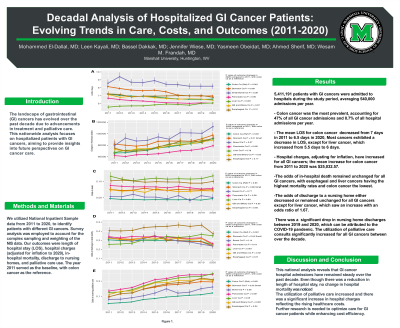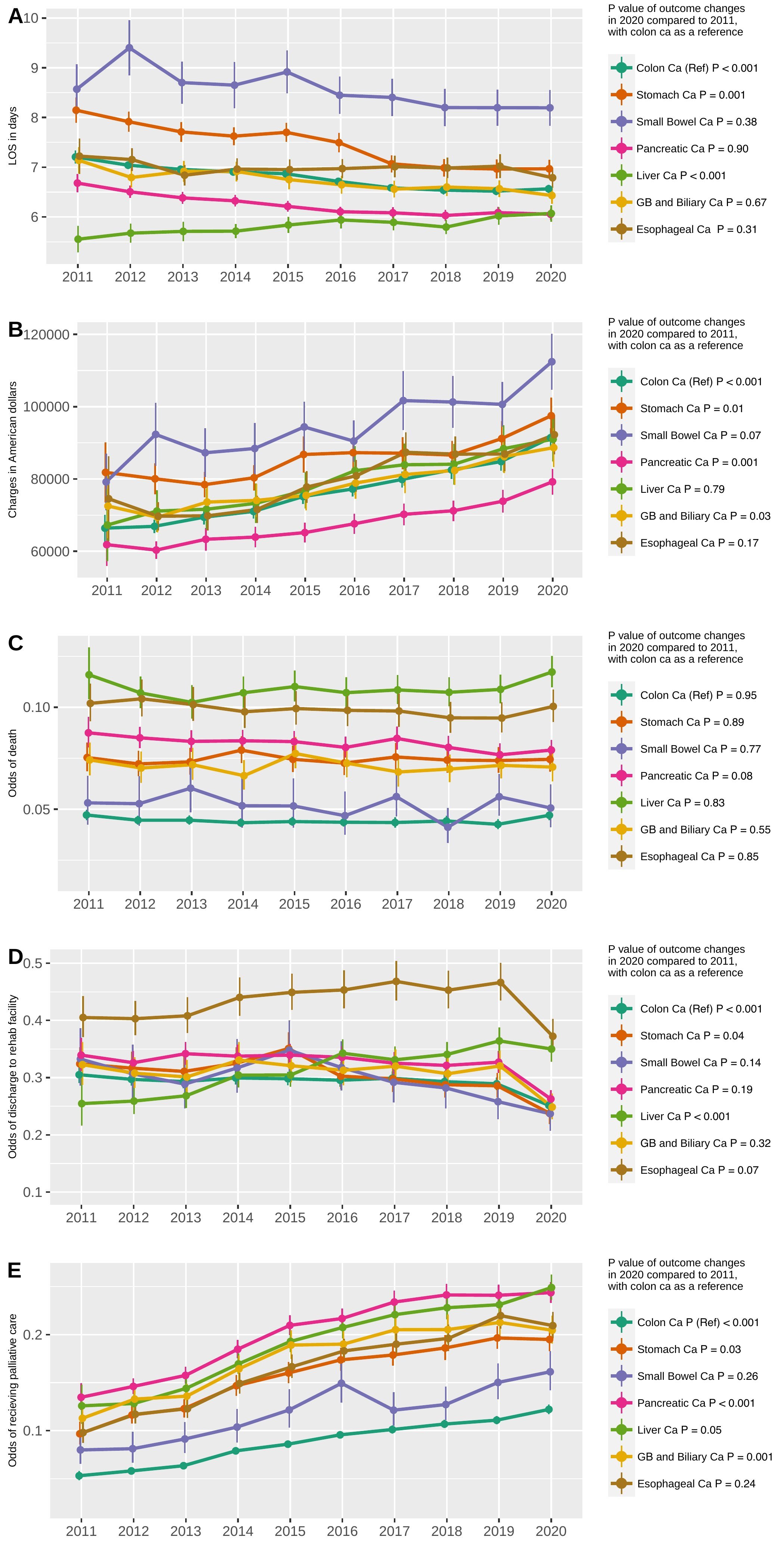Monday Poster Session
Category: Colon
P1937 - Trends in Hospitalized Gastrointestinal Cancer Patients: A Decade of Evolving in Care, Costs, and Outcomes (2011-2020)
Monday, October 28, 2024
10:30 AM - 4:00 PM ET
Location: Exhibit Hall E

- JW
Jennifer Wiese, MD
Joan C. Edwards School of Medicine, Marshall University
Huntington, WV
Presenting Author(s)
Mohammed El-Dallal, MD, MMSc1, Leen Kayali, MD2, Bassel Dakkak, MD2, Jennifer Wiese, MD1, Yasmeen Obeidat, MD2, Ahmed Sherif, MD2, Wesam M. Frandah, MD2
1Joan C. Edwards School of Medicine, Marshall University, Huntington, WV; 2Marshall University Joan C. Edwards School of Medicine, Huntington, WV
Introduction: The landscape of gastrointestinal cancers (GI-Ca) has evolved over the past decade due to advancements in treatment and palliative care. This nationwide analysis examines hospitalized GI-Ca patients, aiming to highlight changing epidemiological patterns and future care perspectives.
Methods: The National Inpatient Sample (NIS) data (2011-2020) was used, and patients with GI-Ca, including colon, stomach, small bowel, pancreas, primary liver, gallbladder/biliary, and esophageal cancers were identified. Survey analysis was employed to account for the sampling and weighting of the NIS data. Our outcomes were length of hospital stay (LOS), hospital charges (adjusted for inflation to 2020), in-hospital mortality, discharge to nursing homes (NH), and palliative care use. The year 2011 served as the baseline, with colon cancer as the reference.
Results: During the study period, 5,411,191 patients with GI-Ca were admitted to hospitals, averaging 540,000 admissions annually. Colon cancer was the most prevalent, accounting for 47% of GI-Ca admissions and 0.7% of all hospital admissions per year (Table 1). The mean LOS for colon cancer patients decreased from 7.21 days (95%CI 7.08-7.32) in 2011 to 6.57 days (95%CI 6.48-6.65, P< 0.001) in 2020. Most cancers exhibited a decrease in LOS over the decade, except for liver cancer, which increased by 0.52 days (95%CI 0.32-0.83) [Fig1.A]. Hospital charges, adjusted for inflation, have increased for all GI-Ca; with colon cancer charges rising by $25,032.57 (95%CI 20,463.09-29,602.07) [Fig1.B]. The odds of hospital death remained unchanged for all GI-Ca over the decade, with esophageal and liver cancers having the highest mortality rates and colon cancer the lowest (Fig1.C). The odds of discharge to a NH either decreased or unchanged for all GI-Ca patients except those with liver cancer, which saw an increase with an odds ratio of 1.67 (95%CI 1.41-1.98) [Fig1.D]. There was a significant drop in NH discharges between 2019 and 2020, attributed to the COVID-19 pandemic. The utilization of palliative care consults significantly increased for all GI-Ca between 2011 and 2020 (Fig1.E).
Discussion: This national analysis reveals that GI-Ca hospital admissions remained steady over the past decade. Despite reduction in LOS, unchanged hospital mortality, and increased palliative care use, hospital charges significantly increased, reflecting rising healthcare costs. Further research is needed to optimize care and enhance cost efficiency for GI-Ca patients.

Note: The table for this abstract can be viewed in the ePoster Gallery section of the ACG 2024 ePoster Site or in The American Journal of Gastroenterology's abstract supplement issue, both of which will be available starting October 27, 2024.
Disclosures:
Mohammed El-Dallal, MD, MMSc1, Leen Kayali, MD2, Bassel Dakkak, MD2, Jennifer Wiese, MD1, Yasmeen Obeidat, MD2, Ahmed Sherif, MD2, Wesam M. Frandah, MD2. P1937 - Trends in Hospitalized Gastrointestinal Cancer Patients: A Decade of Evolving in Care, Costs, and Outcomes (2011-2020), ACG 2024 Annual Scientific Meeting Abstracts. Philadelphia, PA: American College of Gastroenterology.
1Joan C. Edwards School of Medicine, Marshall University, Huntington, WV; 2Marshall University Joan C. Edwards School of Medicine, Huntington, WV
Introduction: The landscape of gastrointestinal cancers (GI-Ca) has evolved over the past decade due to advancements in treatment and palliative care. This nationwide analysis examines hospitalized GI-Ca patients, aiming to highlight changing epidemiological patterns and future care perspectives.
Methods: The National Inpatient Sample (NIS) data (2011-2020) was used, and patients with GI-Ca, including colon, stomach, small bowel, pancreas, primary liver, gallbladder/biliary, and esophageal cancers were identified. Survey analysis was employed to account for the sampling and weighting of the NIS data. Our outcomes were length of hospital stay (LOS), hospital charges (adjusted for inflation to 2020), in-hospital mortality, discharge to nursing homes (NH), and palliative care use. The year 2011 served as the baseline, with colon cancer as the reference.
Results: During the study period, 5,411,191 patients with GI-Ca were admitted to hospitals, averaging 540,000 admissions annually. Colon cancer was the most prevalent, accounting for 47% of GI-Ca admissions and 0.7% of all hospital admissions per year (Table 1). The mean LOS for colon cancer patients decreased from 7.21 days (95%CI 7.08-7.32) in 2011 to 6.57 days (95%CI 6.48-6.65, P< 0.001) in 2020. Most cancers exhibited a decrease in LOS over the decade, except for liver cancer, which increased by 0.52 days (95%CI 0.32-0.83) [Fig1.A]. Hospital charges, adjusted for inflation, have increased for all GI-Ca; with colon cancer charges rising by $25,032.57 (95%CI 20,463.09-29,602.07) [Fig1.B]. The odds of hospital death remained unchanged for all GI-Ca over the decade, with esophageal and liver cancers having the highest mortality rates and colon cancer the lowest (Fig1.C). The odds of discharge to a NH either decreased or unchanged for all GI-Ca patients except those with liver cancer, which saw an increase with an odds ratio of 1.67 (95%CI 1.41-1.98) [Fig1.D]. There was a significant drop in NH discharges between 2019 and 2020, attributed to the COVID-19 pandemic. The utilization of palliative care consults significantly increased for all GI-Ca between 2011 and 2020 (Fig1.E).
Discussion: This national analysis reveals that GI-Ca hospital admissions remained steady over the past decade. Despite reduction in LOS, unchanged hospital mortality, and increased palliative care use, hospital charges significantly increased, reflecting rising healthcare costs. Further research is needed to optimize care and enhance cost efficiency for GI-Ca patients.

Figure: Figure 1 Trends of outcomes in gastrointestinal cancers over a decade: A. Length of hospital stay (LOS), B. Hospital charges, C. Odds of death, D. Odds of discharge to rehabilitation facilities, and E. Odds of receiving palliative care.
LOS= Length of hospital stay, Ref = reference group
LOS= Length of hospital stay, Ref = reference group
Note: The table for this abstract can be viewed in the ePoster Gallery section of the ACG 2024 ePoster Site or in The American Journal of Gastroenterology's abstract supplement issue, both of which will be available starting October 27, 2024.
Disclosures:
Mohammed El-Dallal indicated no relevant financial relationships.
Leen Kayali indicated no relevant financial relationships.
Bassel Dakkak indicated no relevant financial relationships.
Jennifer Wiese indicated no relevant financial relationships.
Yasmeen Obeidat indicated no relevant financial relationships.
Ahmed Sherif indicated no relevant financial relationships.
Wesam Frandah: Endogastric solution – Consultant.
Mohammed El-Dallal, MD, MMSc1, Leen Kayali, MD2, Bassel Dakkak, MD2, Jennifer Wiese, MD1, Yasmeen Obeidat, MD2, Ahmed Sherif, MD2, Wesam M. Frandah, MD2. P1937 - Trends in Hospitalized Gastrointestinal Cancer Patients: A Decade of Evolving in Care, Costs, and Outcomes (2011-2020), ACG 2024 Annual Scientific Meeting Abstracts. Philadelphia, PA: American College of Gastroenterology.
